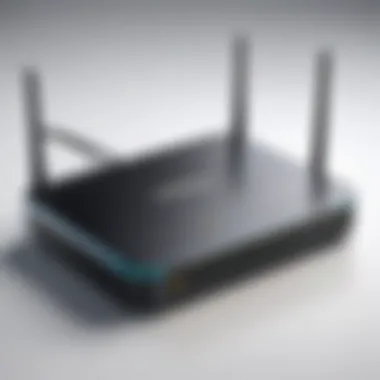Setting Up a VPN Router: A Comprehensive Guide


Intro
In today’s digital age, where every internet move is monitored, setting up a Virtual Private Network (VPN) router has become increasingly relevant. More than just a matter of convenience, it’s an essential step for those who seek to enhance their online security and privacy. A VPN router encrypts all the traffic in a home network, ensuring that every device connected is protected against cyber threats. This guide aims to provide you with comprehensive insights into the process involving VPN router setups, along with best practices and troubleshooting strategies that may arise during the configuration.
Cybersecurity Threats and Trends
Understanding the digital landscape is pivotal when implementing any security measure, including a VPN router. Cybersecurity threats continue to evolve, making awareness a priority for users at any skill level.
Notable Cybersecurity Threats in the Digital Landscape
Several cybersecurity threats can affect both individuals and businesses. Some of the most notable include:
- Malware: Malicious software intended to disrupt, damage, or gain unauthorized access to computer systems.
- Phishing: Deceptive tactics often used to obtain sensitive information by pretending to be a trustworthy source.
- Ransomware: A specific type of malware that encrypts files and demands a ransom for restoration.
Emerging Trends in Cyber Attacks and Vulnerabilities
As technology develops, so do attack methods. Emerging trends include the use of IoT devices as entry points for attacks and AI-driven attacks that can learn and adapt to bypass conventional security measures.
Impact of Cyber Threats on Individuals and Businesses
The impact of these threats is profound. Individuals may suffer from identity theft or financial loss, while businesses face data breaches that can lead to significant reputational damage and regulatory penalties.
Best Practices for Cybersecurity
To safeguard against such threats, awareness and proactive measures are necessary. Here are some best practices:
- Importance of Strong Password Management: Regularly changing passwords and utilizing complex combinations of letters, numbers, and symbols can reduce vulnerability.
- Implementing Multi-factor Authentication: This adds an additional layer of security, making unauthorized access much more difficult.
- Regular Software Updates and Patches: Ensuring that all software is up to date helps protect against vulnerabilities.
- Secure Online Browsing Habits: Avoiding suspicious links and using HTTPS websites enhance security.
Privacy and Data Protection
Online privacy and data protection are at the forefront of using a VPN router. Protecting sensitive information from prying eyes is essential.
Importance of Data Encryption for Privacy
Data encryption is crucial as it makes intercepted data unreadable. VPNs use encryption to secure user data during transmission, making it virtually impossible for outsiders to decipher.
Risks Associated with Sharing Personal Information Online
Sharing personal information can expose users to various risks. Understanding what to share and with whom is vital for online safety.
Strategies for Safeguarding Sensitive Data and Personal Details
- Limit Personal Information Sharing: Only share what is necessary, and reconsider the need before sharing.
- Utilize Secure Networks: Always connect to secure and trusted networks, especially when accessing sensitive information.
Security Technologies and Tools
Exploring relevant technologies is essential for those keen on mastering online security.
Overview of Key Cybersecurity Tools and Software
Several tools can bolster online security:
- Antivirus Programs: These safeguard systems from malware and threats.
- Firewalls: They act as a barrier between a trusted internal network and untrusted external networks.
- VPNs: They encrypt data and mask IP addresses, providing enhanced privacy.
Benefits of Using Antivirus Programs and Firewalls
Using antivirus software prevents malware infections, while firewalls protect against unauthorized access, creating a robust defense against potential threats.
Cybersecurity Awareness and Education
A well-informed user base can better resist and counteract cyber threats. Education is paramount.
Educating Individuals on Recognizing Phishing Attempts
Phishing can be detected by understanding signs like suspicious sender addresses and poor grammar in emails.
Promoting Cybersecurity Awareness in the Digital Age
Regular training sessions or workshops can help users stay informed about the latest security practices and common scams.
Resources for Learning About Cybersecurity Fundamentals


Utilizing available resources, such as websites like Wikipedia and Reddit, can provide valuable knowledge and updates on cybersecurity trends and best practices.
Prioritizing security measures, coupled with informed decision-making, can drastically reduce the risks individuals and businesses face in today’s interconnected world.
Understanding VPN Routers
Understanding VPN routers is crucial for enhancing online security and privacy. These devices serve as the bridge between your home network and the internet, ensuring that all data transmitted is encrypted and secure. In a world where cyber threats are ever-present, being informed about VPN routers can empower users to protect their online activities.
Definition and Functionality
A VPN router is a specific type of router that facilitates a Virtual Private Network connection. Essentially, it routes all internet traffic from connected devices through an encrypted tunnel, which masks the user's IP address. This process prevents external entities from tracking online behavior. When you connect to a VPN, it appears like you are accessing the internet from a different location. This is beneficial for accessing region-locked content or enhancing privacy from unwanted surveillance.
These routers incorporate various protocols such as OpenVPN and IKEv2 to encrypt data packets and facilitate secure communication. They also provide the option to manage multiple devices simultaneously without compromising speed or performance. The router connects directly to a VPN service provider. This means that every device in the home network enjoys the benefits of a VPN connection without needing separate software installations.
Benefits of Using a VPN Router
The advantages of utilizing a VPN router are manifold:
- Increased Security: A VPN router enhances network security by encrypting data before it travels over the internet. This is particularly useful when using public Wi-Fi networks.
- Better Privacy: With a VPN, the user's real IP address is concealed, making it harder for websites and services to track online activities.
- Device Compatibility: Unlike individual VPN clients, a router acts as a single point of entry for all devices connected to it. This includes smart TVs, gaming consoles, and mobile devices.
- Ease of Setup: Once configured, a VPN router requires little to no management. Unlike standalone VPN applications, users do not need to remember to connect each time they use a device.
- Bypass Geo-Restrictions: Users can access content limited to certain countries, which may not be available otherwise. This is essential for streaming services and avoiding censorship in some regions.
Investing in a VPN router is a smart step toward ensuring digital safety in today’s connected world.
Types of VPN Routers
Understanding the different types of VPN routers is crucial for anyone looking to enhance their online privacy and security. The choice of the router can significantly affect your VPN experience, including speed, reliability, and ease of configuration. Knowing the specific features and benefits associated with each type of router allows users to make informed decisions based on their unique needs.
Hardware-Based VPN Routers
Hardware-based VPN routers come with built-in VPN capabilities directly integrated into the router’s firmware. This setup means that users can connect various devices to the VPN without needing individual software installations. One major advantage of these routers is that they often provide better performance, as they can handle the encryption and decryption processes efficiently.
Additionally, hardware-based solutions typically come with higher security standards, making them ideal for users who prioritize data protection. When selecting a hardware VPN router, look for features such as support for multiple VPN protocols, strong encryption standards, and a user-friendly interface for easier management. Brands like Asus and Netgear offer reliable options in this category, catering to both residential and commercial needs.
Key Benefits of Hardware-Based VPN Routers:
- Integrated VPN features without additional software.
- Better processing for encryption performance.
- Enhanced security straight from the router.
- Capability to manage multiple connections seamlessly.
Software-Based VPN Routers
Software-based VPN routers operate using software applications that allow devices to connect to a VPN service. Often installed on existing routers or dedicated devices, they can be a cost-effective alternative for users who want to experiment with VPN technology without purchasing new hardware. However, it should be noted that performance might vary depending on the router’s specifications and processing power.
One significant consideration with software-based solutions is that they require initial setup through individual devices, which may be cumbersome for some users. Nonetheless, they are highly customizable and often come with rich features, such as automatic kill switches and the ability to change VPN servers easily, enhancing flexibility and user control.
Key Benefits of Software-Based VPN Routers:
- Cost-effective solution for existing hardware.
- High customizability to suit user needs.
- Rich features such as automatic security protocols.
- Flexibility to connect on various devices easily.
In summary, understanding the types of VPN routers helps users align their security needs with the appropriate technology. Whether opting for a hardware solution or a software-based router, knowing the pros and cons can lead to a more secure online experience.
Choosing the Right VPN Router
Choosing the right VPN router is critical for ensuring that you maximize the benefits of VPN technology. Your router acts as the gateway to your home network and, consequently, will determine how effectively your internet connection is secured and optimized. A suitable VPN router not only provides security but also enhances the overall browsing experience. Factors like speed, security features, and compatibility with your VPN provider should be at the forefront of your decision-making process.
Selecting the correct device can have significant implications for your online privacy. It’s essential to identify your specific needs, whether that involves streaming content, gaming, or general browsing. Each activity may demand different features, which can help you narrow down your options in this crowded market.
Key Features to Consider
When evaluating VPN routers, assess the following key features:
- VPN Protocols Supported: Not all routers support the same protocols. Look for routers compatible with OpenVPN, IKEv2, or L2TP/IPsec, as these are among the most secure.
- Router Speed: High-speed routers ensure that using a VPN doesn’t slow down your internet connection significantly. Check the Mbps ratings and reviews focusing on real-world speed tests.
- Simultaneous Connections: Different routers allow various numbers of simultaneous connections. If you have many devices that require VPN protection, select a router that supports multiple connections without sacrificing performance.
- User Interface and Setup: A router with a user-friendly interface can simplify the setup process. Look for options with intuitive dashboards for easy management.
- Firmware Updates: Regular firmware updates can improve security and functionality. Check if the manufacturer has a track record of providing timely updates.
- Security Features: Additional security features such as a built-in firewall, advanced threat detection, and hardware encryption can enhance your online protection.
Considering these features will guide you in making an informed choice.
Brand Recommendations
When it comes to selecting a VPN router, a few brands have established themselves as reliable leaders in the industry. Here are some recommendations:
- Asus: Known for solid performance and a range of features, Asus routers like the Asus RT-AC86U are frequently mentioned for their balance of speed and security.
- Linksys: The Linksys WRT3200ACM supports OpenVPN and is well-regarded for its customization options.
- Netgear: Their Nighthawk series, particularly the Nighthawk RAX70, offers top-tier performance and is suitable for advanced users seeking robust features.
- TP-Link: The TP-Link Archer A7 is a budget-friendly option that provides decent performance for less demanding users.
Each of these brands offers different models with specific features that adapt to various user needs. Always assess your unique requirements before purchasing, as what works for one user may not fit another's situation.
"A solid VPN router is more than just a device; it is your first line of defense in an increasingly connected world."
By carefully considering these factors and recommendations, you can make an informed decision that not only meets your current needs but also adapts to future ones.


Preparing for Setup
Preparing for setup is a critical phase when it comes to configuring a VPN router. This stage lays the groundwork for a smooth installation process and ultimately determines the performance and effectiveness of the VPN network. By gathering the necessary information and setting up VPN account details, users can avoid common pitfalls and ensure secure browsing experience.
Gathering Necessary Information
Before diving into the configuration process, it is essential to gather pertinent information that will facilitate a seamless setup. Key details include:
- Router Model and Firmware: Knowing the specific model of your router and its firmware version is crucial. This information helps you refer to the correct user manual or online resources that provide tailored support.
- VPN Provider Details: Users should obtain details from their VPN provider such as server addresses, connection protocols, and authentication methods. These elements are vital for correctly configuring the VPN settings on the router.
- Network Setup Information: Understand your current network configuration. This includes knowing your IP address range, DHCP settings, and any static IPs that may be in use. This understanding assists in preventing configuration conflicts and enhancing connectivity.
- Login Credentials: Ensure you have access to both your router's admin credentials as well as your VPN account username and password. Without these, access to your router settings and VPN service will not be possible.
In essence, gathering this information prior to setup minimizes disruptions and time wasted in troubleshooting later.
Setting Up VPN Account Details
Once the necessary information has been accumulated, the next step is to input the VPN account details into the router interface. This process typically involves:
- Accessing the Router's Admin Page: Open a web browser and input the router’s local IP address to reach the admin panel. Enter your credentials to log in.
- Navigating to the VPN Section: Locate the VPN configuration section within the settings. This can often be found under the “Advanced Settings” or “VPN” menu, depending on the router brand.
- Inputting VPN Credentials: Enter the username and password provided by your VPN service. Additionally, input the server address or addresses you wish to connect to. This saves on having to configure the connection on each device individually.
- Selecting Connection Protocol: Choose the appropriate connection protocol as recommended by your VPN provider. Common options include OpenVPN, L2TP, or PPTP. The choice can influence both security and connection speed.
- Saving Settings: After filling in all details accurately, ensure that you save the changes. Some routers require a reboot for the changes to take effect.
Setting up VPN account details correctly is paramount for ensuring that all connected devices benefit from the VPN's privacy and security features.
Conclusion: Proper preparation for setting up a VPN router not only streamlines the process but also fortifies the overall security architecture. By gathering necessary information and accurately entering VPN account details, users position themselves for success in achieving secure and private internet access.
Configuring the VPN Router
Configuring the VPN router is a critical step in harnessing the full potential of VPN technology. This section of the guide will assist users in navigating the intricate process of setting up their routers to operate effectively with a VPN. Proper configuration ensures that all devices connected to the router will benefit from the privacy and security provided by a VPN, which can be particularly valuable in today's digitally connected environment.
Accessing the Router Interface
To begin with, accessing the router interface is the first step towards configuring a VPN router. Typically, this can be done through a web browser by entering the router's IP address, usually in the format of 192.168.1.1 or 192.168.0.1, depending on the router model. You may need to log in using the admin credentials, which are often printed on the router or found in the user manual. It's crucial to change the default password, as this can greatly improve the security of your network.
Once logged in, users will be greeted with a dashboard that allows them to manage various settings. Familiarizing yourself with this interface is essential since any misconfiguration can lead to connectivity issues or security vulnerabilities. Look for sections labeled as "VPN" or "Advanced Settings," which will house the configuration options necessary for this process.
Inputting VPN Credentials
After accessing the interface, the next step involves inputting the VPN credentials. These credentials typically include the server address, username, and password, which should be obtained from your VPN service provider. It's vital to enter this information accurately to avoid any interruptions in service.
Some routers support a simple interface for entering VPN credentials, while others may require a more manual method involving OpenVPN configuration files. In cases where OpenVPN is used, you might be required to upload .ovpn files directly into the router's settings. Ensure you double-check each field for accuracy, as an error here can prevent a successful connection.
Adjusting Advanced Settings
Finally, adjusting advanced settings can optimize the performance and security of the VPN connection. Users may want to explore options like enabling network protocols such as OpenVPN or PPTP, depending on what the VPN provider supports. Additionally, configuring DNS settings is also important; using a VPN service's DNS can help prevent DNS leaks, which can expose your browsing activity.
Other pertinent settings may include configuring the router’s firewall and creating rules for specific ports, which can enhance security measures further. Each router brand differs in its advanced settings, so consulting the documentation specific to your router model is recommended.
"Proper configuration of your VPN router is not just about securing your data; it's about maintaining the integrity of your entire network against potential threats."
Testing the VPN Connection
Testing your VPN connection is a crucial step after configuring a VPN router. It ensures that the setup process was successful and that your internet connection is secure and private. A proper test can validate that your online activities are protected from prying eyes. Moreover, it enables you to identify any potential issues that need addressing, thereby preventing unexpected lapses in security.
A well-tested VPN connection confirms that data is encrypted and that your real IP address is hidden. The importance of this verification cannot be understated, especially for professionals in the IT and cybersecurity fields who require robust and reliable online privacy. A failure to ensure a functioning VPN can expose sensitive data, making testing an integral part of the setup process.
Methods for Testing
There are several methods to test your VPN connection effectively. Each method provides different insights into your VPN's performance and security. Here are some common strategies to consider:
- Using Online VPN Test Tools: There are websites that can check if your VPN is working correctly. These tools often show your public IP and location. Using them before and after connecting to your VPN can be informative.
- Ping Tests: A simple ping test can give basic information about the VPN's response time. Consistent pings without timeouts usually indicate a stable connection.
- Checking DNS Leaks: It's essential to ensure that your DNS queries are routed through the VPN. A DNS leak can expose your browsing activities. Tools are available specifically for DNS leak testing.
- Speed Tests: After connecting to the VPN, perform speed tests to compare your connection speed before and after activation. A significant drop in speed might indicate issues with the VPN service.
- Accessing Region-Specific Content: If your VPN is designed to allow access to geo-restricted content, try accessing websites available only in specific regions. If you can access them, the VPN is likely functioning correctly.
Using these methods in combination will provide a comprehensive understanding of your VPN's performance.
Verifying IP Address Change
One of the first checks to perform after configuring the VPN is verifying the change of your IP address. This step is fundamental as it confirms that your real IP address has been effectively masked by the VPN service. To check whether this change has taken place, follow these steps:
- Before Connecting to the VPN: Use a reliable online IP checker (like whatismyip.com) to note down your original IP address.
- Connect to the VPN: Follow the appropriate steps to connect your device to the VPN router.
- Recheck Your IP Address: After connecting, revisit the IP checker. Your displayed IP should differ from the one obtained in step one.
- Confirm Location: The new IP should correlate with the location of the server you're connected to. If you connect to a server in the UK, your IP should display as if it's from there.
This verification step is vital not only for confirming the connection but also for ensuring your privacy. If your original IP address still appears after connecting to the VPN, it indicates a problem that needs immediate attention.
Common Issues and Troubleshooting
The section on Common Issues and Troubleshooting is crucial for anyone setting up a VPN router. Even with careful preparation and configuration, users often face challenges that can disrupt their experience. Knowing how to identify and resolve these issues can greatly improve the effectiveness of a VPN setup. This helps ensure reliable connections and optimal online privacy. Understanding these common problems is essential not only for troubleshooting but also for maintaining a consistent and secure internet experience.


Connectivity Problems
Connectivity issues are among the most prevalent problems users encounter when working with VPN routers. These problems may manifest as an inability to connect to the VPN server, timeouts during connection attempts, or complete loss of internet access when the VPN is enabled.
To diagnose connectivity problems, first check the physical connections and ensure that the router is properly connected to both power and the internet source. Additionally, verifying that the router's firmware is up to date can resolve many issues. Sometimes, configuration errors during VPN setup may be the cause, leading to connection failures due to incorrect input of server addresses or login credentials. Restarting both the router and the device attempting to connect may also help fix minor connection glitches.
Slow Internet Speeds
Users may notice a drop in internet speed when using a VPN router. This slowdown can be frustrating, especially if the VPN is intended to enhance privacy. Several factors contribute to this, including server load and the geographical distance between the user and the VPN server.
To mitigate slow speeds, first try connecting to a server closer to your location. Many VPN services offer multiple server options, and choosing a less congested server can significantly enhance performance. Additionally, checking if the router supports protocols like OpenVPN or IKEv2 can lead to better speed management. Users should also assess their internet connection speed before and after enabling the VPN to identify whether the slowdown is occurring due to the VPN itself or a separate connection issue.
Incompatibility Issues
Incompatibility can arise when certain devices or software do not fully support VPN configurations. This can lead to application failures or unpredictable behavior. Devices like smart TVs, gaming consoles, or specific mobile devices sometimes struggle to operate effectively with certain VPN routers.
If you encounter incompatibility issues, consult the manufacturer's website for any specific instructions or device compatibility updates. Applying firmware upgrades for the router and ensuring that the VPN client is set up correctly on user devices are essential steps. Sometimes, using a different VPN protocol can resolve these discrepancies, enhancing overall compatibility.
Maintaining Your VPN Router
Maintaining your VPN router is a crucial component that should not be overlooked. Proper maintenance ensures the router operates smoothly, maximizing the benefits of a VPN connection. Regular upkeep can lead to better performance, enhanced security, and extended device longevity. As with all technology, neglecting routine maintenance can result in performance degradation, vulnerabilities, and increased susceptibility to cyber threats.
Regular Firmware Updates
Regular firmware updates are essential for keeping your VPN router secure and functioning effectively. Firmware is the software that provides control over the hardware in the router. Manufacturers frequently release updates to address bugs, security vulnerabilities, and to enhance overall performance. Failing to update the firmware can expose your device to unnecessary risks. Some potential benefits of regular firmware updates include:
- Enhanced Security: Updates often include patches for security vulnerabilities that could be exploited by attackers.
- Improved Performance: Regular updates can provide optimizations that enhance the speed and stability of your connection.
- New Features: Firmware updates sometimes introduce new functionalities that can further improve your user experience.
- Compatibility Improvements: Staying current ensures that your router remains compatible with the latest VPN protocols and technologies.
To update your firmware, you usually need to log into your router's web interface. Here, find the firmware section, check for any available updates, then follow the recommended steps to install them. Always backup your current settings before updating, as sometimes updates can reset configurations.
Monitoring VPN Performance
Monitoring VPN performance is another vital aspect of maintaining your VPN router. Regular checks help identify potential issues early and allow for quick troubleshooting. Observing performance metrics can give insights into how well your VPN connection is functioning and if your router is efficiently handling traffic.
Key factors to monitor include:
- Connection Speed: Regularly test your internet speed using tools like Speedtest.net. An unexpected drop in speed may indicate a problem with your VPN connection or router configuration.
- Latency: High latency can affect your browsing experience, especially for activities like gaming or video streaming. Keeping track of latency values is essential for determining your connection's responsiveness.
- Data Usage: Monitoring how much data is being transmitted through your VPN can help identify unusual spikes that could indicate security breaches or unauthorized usage.
Remember that optimal performance involves balancing the right tools and settings. In cases of persistent issues, consulting your VPN provider's support may yield solutions tailored to your specific situation. Regular adherence to these maintenance tasks will help ensure your VPN router continues to provide secure and efficient internet access.
Enhancing Security with VPN Routers
VPN routers serve as a robust first line of defense in protecting your online activities. With the rise of cyber threats and increasing awareness around data privacy, enhancing security through VPN routers is not just beneficial; it is essential. This section explores important elements and benefits associated with the enhanced security features offered by VPN routers. By understanding these components, users can better protect their internet connection and sensitive data from potential breaches.
Implementing Additional Security Features
VPN routers often come equipped with various security features that can significantly bolster your online safety. These features are designed to mitigate risks and provide additional layers of protection. Key implementations include:
- Firewall Settings: Many routers offer built-in firewalls that protect against unwanted traffic and potential threats. Implementing these settings is crucial.
- Intrusion Detection Systems (IDS): An IDS monitors network traffic for suspicious activity. By recognizing and responding to threats in real-time, this feature enhances overall network security.
- Network Segmentation: Dividing a network into smaller segments can limit potential threats. If one segment is compromised, others may remain secure.
- DNS Leak Protection: This feature ensures your DNS requests remain encrypted and do not leak to your Internet Service Provider. Maintaining confidentiality about your online activities is vital for your data privacy.
Regularly updating the router’s firmware is essential. These updates often include security patches and new features. Keeping your software up to date is a simple yet effective way to protect your network.
Ensuring Data Privacy
Data privacy is a primary concern for anyone utilizing internet services. A VPN router provides a secure environment in which personal information can remain private. It accomplishes this through:
- Encryption: All data transmitted through a VPN is encrypted. This means that even if the data were to be intercepted, it would be unreadable, preventing unauthorized access.
- Anonymity: By masking your IP address, a VPN router helps keep your browsing habits anonymous, making it substantially more difficult for entities to trace your online activities back to you.
- IP Address Masking: This feature further enhances privacy. It not only helps maintain anonymity but also gives access to region-restricted content without exposure to local internet surveillance.
"Using a VPN router is one of the most effective ways to protect your online privacy and ensure the data you send over the internet remains confidential."
In summary, enhancing security with VPN routers is a necessary step for anyone serious about protecting their online presence. With features such as encryption and Wi-Fi security settings, these routers form a secure backbone for all devices connected to them. Understanding the importance of implementing additional security features and ensuring data privacy can empower users to navigate the digital landscape safely.
Closure
The conclusion of this article serves as a pivotal moment to synthesize the comprehensive information provided on setting up a VPN router. This guide encapsulates the significance of understanding the nuances of VPN technology and the crucial role routers play in ensuring secure online experiences.
Recap of Key Points
Throughout this article, several fundamental concepts were discussed. These key points include:
- Understanding VPN Routers: Knowing their definition and functionality helps to appreciate the necessity of these devices.
- Benefits of Using a VPN Router: Enhanced security, privacy, and the ability to connect multiple devices are notable advantages.
- Variety of Router Types: Familiarity with hardware-based versus software-based VPN routers informs better purchasing decisions.
- Choosing the Right VPN Router: Awareness of key features and product recommendations guides users toward suitable options.
- Preparation for Setup: Properly gathering necessary information lays the groundwork for effective configuration.
- Configuration Steps: Accessing the router interface, inputting VPN credentials, and adjusting settings are essential actions for successful setup.
- Testing and Troubleshooting: Knowing how to verify connection success and address potential issues enhances user experience.
- Maintenance Practices: Regular firmware updates and performance monitoring are vital for long-term success.
- Security Enhancements: Implementing additional security features ensures ongoing protection in an evolving technological landscape.
Final Thoughts on VPN Routers
In today’s digital landscape, maintaining online privacy is essential. VPN routers not only safeguard personal data but also create a secure environment for all connected devices. As cyber threats become more sophisticated, the importance of using a VPN router grows. Users must prioritize understanding both the technical specifics and practical implications of their choices. The setup process, while sometimes challenging, is ultimately rewarding. A properly configured VPN router strengthens not just individual privacy but also contributes toward a more secure internet overall. For professionals in IT and cybersecurity, this knowledge underscores the necessity of embracing technology that supports data protection.
"The Internet is a wild west of data. Protect your personal information just like you would your actual belongings."
In summary, investing time and resources into setting up a VPN router effectively fosters an ecosystem where privacy and security are paramount.







